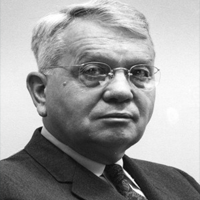Harold Urey
Harold Clayton Urey was an American physical chemist whose pioneering work on isotopes earned him the Nobel Prize in Chemistry in 1934 for the discovery of deuterium.
Harold Clayton Urey received his Bachelor of Science degree in Zoology from the University of Montana in 1917 and a Ph.D. in Chemistry from the University of California in 1923. Following postgraduate work at Niels Bohr’s Institute for Theoretical Physics, he taught at Johns Hopkins University, and was appointed Associate Professor in Chemistry at Columbia University in 1929. In 1934 he was awarded the Nobel Prize in Chemistry for the discovery of deuterium. He continued to research isotopic chemistry, and particularly the separation of isotopes.
Between 1940 and 1945, Urey served as Director of War Research, Atomic Bomb Project, at Columbia University, where he contributed to the Manhattan Project. In 1945, he moved to the University of Chicago’s Institute for Nuclear Studies, becoming the Martin A. Ryerson Professor in 1952. His work at University of Chicago made major contributions to the field of geochemistry. He later went on to positions at Oxford and University of California.
Following World War II, Urey advocated arms control and nuclear safety, joining the Union of Concerned Scientists. Later in his life, he was involved in the U.S. space program as an advisor and consultant.
Urey’s publication include Atoms, Molecules and Quanta (1930, with A.E. Ruark), and The Planets (1952), as well as numerous papers. From 1933 to 1940, he was editor of the Journal of Chemical Physics.

Harold Urey
Date of Birth: 29 Apr 1893
Birth Place: Walkerton, Indiana, United States
Proffession: American physical chemist
Nationality: United states
Death: 5 January 1981, La Jolla, California, United States


